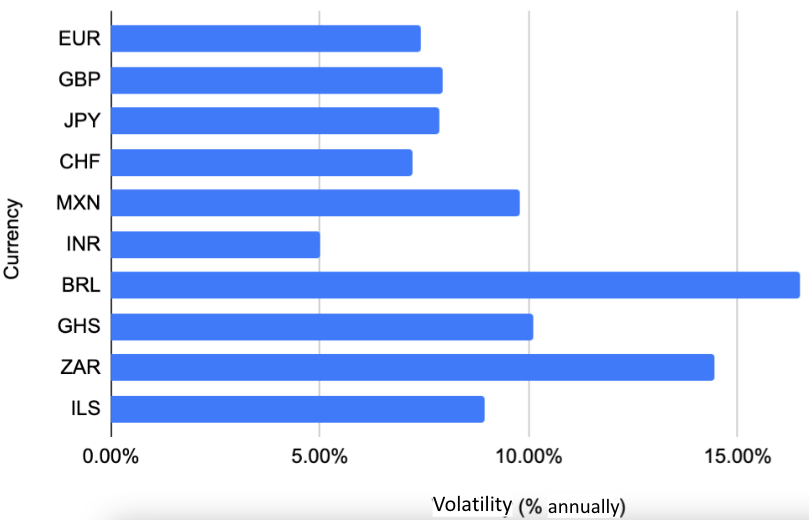Venture capitalists are increasingly flocking to emerging markets in search of high-growth opportunities with higher returns than in developed markets.
One of the risks that many VC fund managers are unaware of or unable to comprehend is the currency risk associated with those economies. Many studies say that this risk has the potential to wash out their efforts over the long term if not managed properly. This article aims to shed light on why currency risks are one of the most important factors for VCs to consider, as well as the benefits they can reap for their portfolio companies if they manage to mitigate those risks effectively.
Emerging Markets studied: Africa, Southeast Asia, Latin America, and India.
Note: VC and Venture capitalists are used interchangeably, and so do the EM and Emerging markets
Table of Contents
1. Snapshot of VCs in EM and the currency risks
Venture Capitalists' success wasn't limited to developed markets like the United States and Europe throughout the pandemic. Despite the risk, emerging markets around the world were able to make their imprint. This section will outline the growth of VCs in Emerging markets in recent years, the reasons behind those investments, and the overview of currency risk associated with these markets.
According to a report by Crunchbase, the number of venture capital deals signed and the sheer channel of funding flows into businesses in emerging regions such as Latin America, Africa, and Southeast Asia has surged in the last few years.
Pic source: Crunchbase database
Latin America has observed consecutive years of growth in VC investments and saw a record fundraising for the 2019 year. This is followed by Southeast Asia and Africa.
A majority of deals were in Fintech, Logistics, and E-commerce sectors across all EMs.
Also, according to the Magnit market report, the amount of investment surged to 3.5x in 2021 compared to the previous years, that is there was a dramatic growth of 228% YoY in EM VC funding.
The reason VC funds find the region attractive is because of the fast growth of startups and favorable demographics. Encouraging trends include a rapidly rising middle class, a youthful population, and growing digital adoption. Some of these trends have been accelerated following Covid.
Additionally, according to Rebecca Hwang, co-founder and CEO of YouNoodle, a startup that assists corporations and governments in identifying high-performing entrepreneurs and talent states that
“One reason these emerging markets appeal to investors is that they are ideal testing grounds for new products, with a young population that is connected to social media ”.
Moreover, data from Invesco shows the real GDP growth for these emerging economies in the last decade was dramatic, with Brazil (5.6x), India (13.1x), and Indonesia (14.3x)
Thus in simple terms, there has been a substantial interest by venture capitalists in emerging markets in the last few years and the greatest advantage for VCs is the potential for rapid growth.
Along with the potential for rapid growth, investing in emerging markets also has some drawbacks. Among these, one of the big cons has been the currency risks, which is due to the highly volatile nature of the markets as well as the less stable economic and political conditions of these countries.
When we say currency risks, Investors are wary of FX risk – specifically, the fear that an investment return in EM companies will be washed away when converted back to U.S. dollars or Euros because the local currency loses its relative value over time.
Source: Bloomberg terminal, 2019
This is keeping billions (perhaps trillions) of dollars off the table from a growth potential, greatly impeding private-sector-driven development and growth according to an EMPEA report.
In a nutshell, from a development standpoint, EMs have significant growth potential; nevertheless, currency issues are a barrier to capital flows, especially for venture capitalists, and removing them can unlock the true growth potential of private capital in these countries.
2. Digging deeper into currency risks for the portfolio companies
When VCs are investing in emerging markets, they face currency risks of two types while investing in emerging market’s companies or a portfolio of companies. First is when these portfolio companies raise funds and begin deploying the funds internationally in local currencies. The longer the deployment period, the greater the risk. Second, as these companies grow, they may have overseas revenues and cost structures that expose them to multi-currency risks. A pictorial representation of these risks is shown below.
Source: Shahid Bharucha for Deaglo
Furthermore, the volatility in emerging markets is higher than in developed economies, according to our Deaglo's FX platform. A statistical term known as value at risk is used to explain how volatility would affect your currency exposures. Assume a USD-denominated fund is investing in BRL, which has annual volatility of 16%. There is a risk of $263,000 for every million dollars invested or spent.

Source: Deaglo FX platform
Also, if we look at the performance of emerging market currencies over the last year, we can see that a majority have depreciated against the dollar. This means that if a fund manager invests in local currencies in any of these economies, there is a guaranteed chance that the fund's return gets washed out when converted to the original currency.
Source: Deaglo FX platform
Hence, this all says that currency risk is a significant factor for VCs while dealing with overseas investments and can play adversely if not managed efficiently.
So what does this mean for VCs looking to pick emerging market opportunities?
Local currency volatility and depreciation can quickly erode operating margins and blow holes in even the best-planned budgets.
Although VC fund managers are not directly involved in their portfolio companies' day-to-day operations, their role is to provide input into operational and strategic aspects of the business, which should include currency management advice. Finally, it is their responsibility to ensure that every aspect of the company's profit margin is maximized.
With that said, these venture capitalists who are active in investing in emerging market companies should employ an effective currency hedging strategy on portfolio company levels to mitigate such risks. In this regard, companies like Deaglo offer FX risk management solutions for VC fund managers to understand their FX exposures while investing/transacting overseas and develop strategies to mitigate those risks and ensure maximum fund returns.
Deaglo’s step-by-step process to deal with currency exposures (Source: Deaglo.com)
3. What are the benefits of hedging portfolio companies?
According to the preceding narrative, it is critical that the local operating entity considers an effective FX risk management framework through which it can maximize value for its investors by improving its own key profitability metrics. These are becoming increasingly important as the current market conditions of global monetary tightening have sent a wave of volatility across all asset classes.
The following are the advantages of an FX hedging program for portfolio companies, primarily potential startups.
- Hedging enables a startup to lock in a foreign exchange rate that stabilizes its overseas operating costs or sales revenue while protecting its budget rate.
- Allows a company more time to respond to rate changes.
- Profit from perceived low market rates.
- Hedging provides predictability in the face of uncertainty in future cash flow projections. As a result, effective business planning is now possible.
- Setting and protecting a budget rate can help a company enter new markets with confidence, expand its global operations, and scale more comfortably and clearly.
A Silicon Valley Bank study backs up the benefits of the aforementioned hedging program. According to the study, which focused on post-IPO companies, small-cap public technology firms that hedged currency risk with derivatives outperformed those that did not on key profitability indicators. This group outperformed non-hedged enterprises in terms of EBITDA, EBITDA growth, and the frequency of negative results.
In a nutshell, an effective hedging strategy can improve the predictability of foreign earnings, protect the firm's value, and reduce the volatility of foreign currency cash flows. Many small and new businesses may wish they had increased their hedging activity during these uncertain economic times to offset the current damage. When a crisis occurs, it is much easier to see the value of hedging.
About the Author
Shahid Bharucha is a market analyst for Deaglo, where he contributes to the company by presenting daily, weekly, and monthly currency reports for major and developing economies.
Shahid can be reached at [email protected].
About Deaglo
Deaglo is a cross-border advisory firm specializing in the execution and risk management of global transactions with Investment Managers, Investors, and startup companies.
Have you got a foreign currency exposure? Speak to an expert today.









